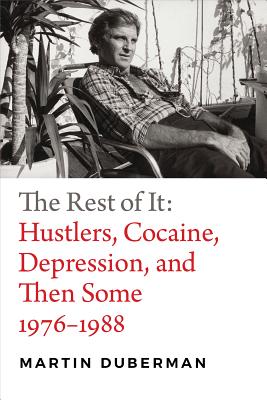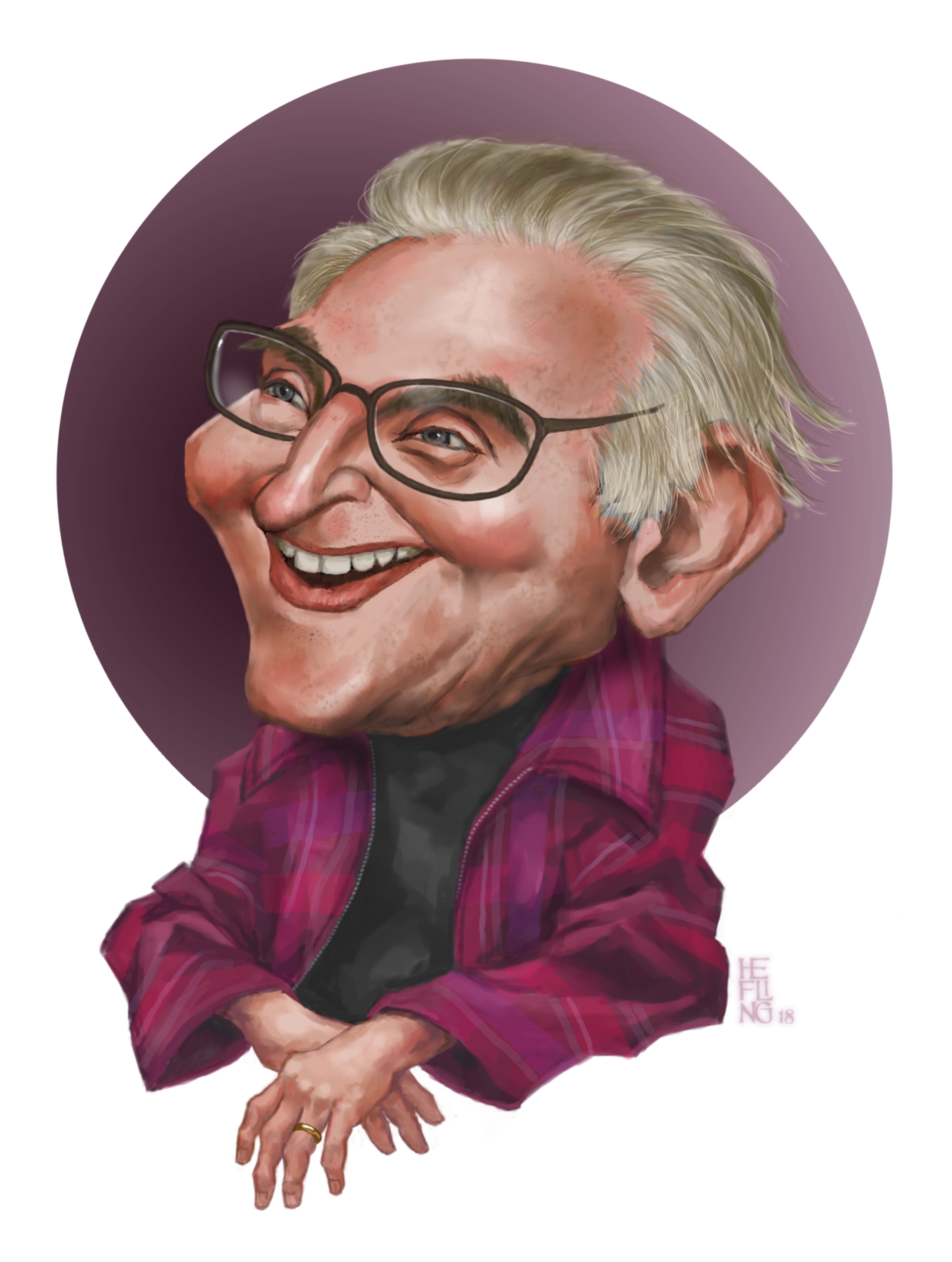 The Rest of It: Hustlers, Cocaine, Depression, and Then Some, 1976–1988
The Rest of It: Hustlers, Cocaine, Depression, and Then Some, 1976–1988
by Martin Duberman
Duke Univ. Press, 240 pages, $27.95
AT ONE POINT in this account of twelve difficult years in his life, Martin Duberman describes a 1981 encounter he had with a woman at a party. In his telling, Sally was a self-described liberal, feminist, ex-Marxist lawyer who owned a Manhattan townhouse and employed “servants.” She had contempt for Martin Luther King, Jr., for promiscuity, and for people who lacked the drive to get ahead in life. She reserved her pity for people who had no children. For two hours, Duberman listened to what readers will easily recognize as pretentious claptrap. When he got home, he wrote in his diary that he should have “swatted the smug bitch.” Still, she got under his skin, and he spent the night feeling sadness and guilt about his life as a gay man.
Throughout The Rest of It, the author re-creates experiences from his past in ways that seem calculated to exasperate his readers. No doubt there’s a reason for this. Duberman, a distinguished historian, has described history as a person in the present engaging in a conversation with the past. This would seem doubly true when the past with which one is conversing is one’s own. Included in this conversation are a number of unflattering portraits of people: handsome but shallow lovers, glib therapists, liberal academics, friends who failed him. But he’s not just settling scores. He describes his interactions with these people in a factual way so that we see what’s happening. Placing himself in the midst of these encounters, he re-experiences the sense of being blind to the way people were treating him and helpless to control his reactions. Using diaries and other personal rec-ords of his life, he tries to reveal as accurately as possible the person he was decades ago in dialogue with the person he is today.
 The book’s subtitle reveals much about its contents. In 1976, Duberman’s mother died from a malignant melanoma. In her final months, there were misdiagnoses by doctors, poor treatment in hospitals, family disputes, and finally an early morning phone call with the news of her demise. As is the case for many gay men, the death of his mother was a profound experience for Duberman. She had pushed him to make something of his life. As he succeeded in this, he became increasingly aware of the opportunities she never had. He told her he was gay, but they were never able to talk about it. His mother’s death sent Duberman into a serious depression. To survive, he turned to therapies that included LSD and bioenergetics. He considered shifting his profession from academic historian to dramatist. After listening to Duberman lament the end of a love affair, the critic Richard Poirier told him to start going to a hustler bar. Later, another friend connected him to a cocaine dealer. None of this worked. What kept him going was writing, specifically gay scholarship, a field he deserves credit for helping to create.
The book’s subtitle reveals much about its contents. In 1976, Duberman’s mother died from a malignant melanoma. In her final months, there were misdiagnoses by doctors, poor treatment in hospitals, family disputes, and finally an early morning phone call with the news of her demise. As is the case for many gay men, the death of his mother was a profound experience for Duberman. She had pushed him to make something of his life. As he succeeded in this, he became increasingly aware of the opportunities she never had. He told her he was gay, but they were never able to talk about it. His mother’s death sent Duberman into a serious depression. To survive, he turned to therapies that included LSD and bioenergetics. He considered shifting his profession from academic historian to dramatist. After listening to Duberman lament the end of a love affair, the critic Richard Poirier told him to start going to a hustler bar. Later, another friend connected him to a cocaine dealer. None of this worked. What kept him going was writing, specifically gay scholarship, a field he deserves credit for helping to create.
Structurally, the book alternates between chapters about Duberman’s personal life and ones that could stand alone as historical essays about gay politics and gay studies. He was a member of the founding board of the National Gay and Lesbian Task Force and active in the gay movement on many fronts. As the gay movement progressed from the radicalism of the 1960s to the hedonism of the ’70s to the AIDS epidemic of the ’80s, Duberman held firmly to two positions: gay “differentness” challenges the rigid assumptions of majority norms, especially those based on racial and gender privilege; and monogamy in relationships is not inherently superior to sexual experimentation. Both have become minority positions in the gay community.
In 1991, after five years of effort, Duberman established the Center for Lesbian and Gay Studies (clags) at the CUNY Graduate School, which he considers one of his most satisfying achievements. By then, having battled for many years with homophobic academicians, publications, and institutions, he was a major figure in LGBT studies. The sections of the book devoted to these topics make informative reading, although they tend to interrupt the narrative of what’s going on in Duberman’s personal life.
That narrative becomes particularly gripping when Duberman describes his descent into addiction and a depression so severe that in 1984 he was hospitalized in a locked ward at Payne Whitney for a month. The story begins with a vacation in Maine. Feeling abandoned by a friend, Duberman fled the outdoors for the familiar territory of New York. Once home, he returned to the routine of hustler bars and cocaine that had become part of his life. This is the point at which the personal and the political begin to collide. Duberman had always told himself that he was not suited to a monogamous relationship due to the psychic pain he’d experienced in his youth, and that sexual adventuring, primarily by engaging hustlers, satisfied his needs. In his heart, however, he couldn’t escape a certain longing for an intimate connection that friends couldn’t provide. In 1987, at a party for the ACLU’s Gay Rights Project, Duberman met a man named Eli, and they began a relationship that continues to the present. About this relationship Duberman writes: “The details don’t matter, aren’t part of this story.” This may be the case, but the entrance of Eli brings this book about a difficult period in the life of a gay icon to an especially satisfying close.
In recovery, Duberman began writing his biography of Paul Robeson. Asked to write the book by Robeson’s son, Paul, Jr., Duberman had been researching it for five years. The routine and discipline of writing, something that Duberman loves to do, were the real source of his recovery. He came to see that the pain he’d experienced early in his life had made him a survivor. After weathering objections from the mentally unstable Paul Jr., Duberman published the Robeson biography in 1989. Many regard it as his masterpiece.
Martin Duberman has been a touchstone for a generation of gay men, and, once again, he offers up his life experiences to help us better understand our own. The Rest of It is a lively book; it forces readers to engage with the difficult, often contentious personality of a brilliantly accomplished gay man wrestling with his demons.
Daniel Burr, who lives in Covington, Kentucky, is a frequent contributor to this magazine.





